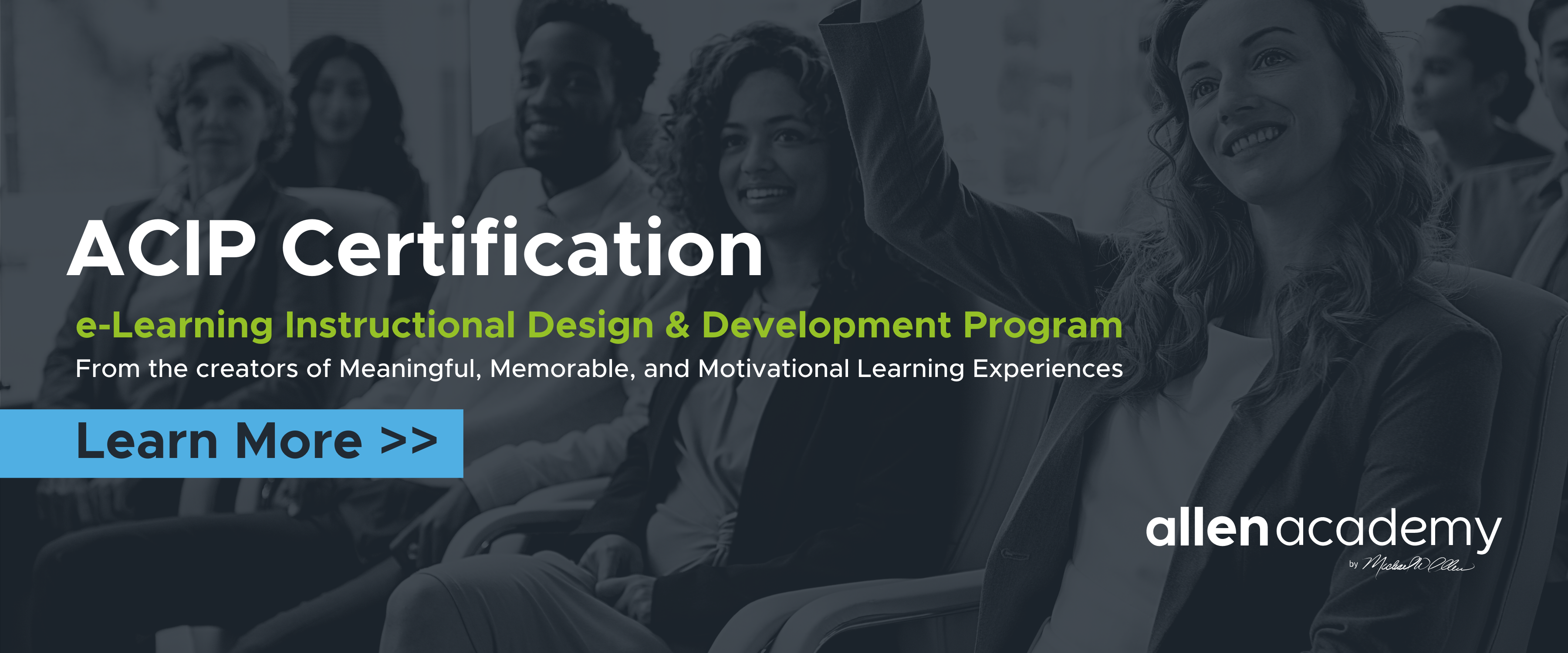Blog
Instructional Design 3.0: Designing the Learner’s Journey - Part 4: ...
Your name is important to you, right? Imagine if everyone had the same name. The name wouldn’t mean anything to anyone.


Moving from Instructional Design —> Learning Experience Design
By Michael Allen | June 11, 2020 | Custom Learning | 0 Comments
Your name is important to you, right? Imagine if everyone had the same name. The name wouldn’t mean anything to anyone.
What’s e-Learning?
Today’s definition of e-learning is so broad, the term has come to mean very little. e-Learning can be everything from a PDF document distributed via e-mail to a complex, data-driven, simulation-based learning experience. So when someone says, “We’re using e-Learning,” we know very little about their instructional program. We only know that it probably uses computers and the Internet for distribution. We know nothing about what kind of instruction or learning support they are providing to their learners.
Who are Instructional Designers?
Instructional Designers, “ID's" for short, are people tasked with developing instruction. That means they determine, among other things, a clear definition of desired outcomes, study the variance in likely capabilities of learners and their readiness to learn, and categorize the nature of the content. No instructional approach is appropriate for all needs, so IDs need to determine what’s best considering all these variables.
In a simplified diagram of the many tasks facing the professional ID, I’ve categorized target outcomes as
- Follow instructions
- Remember and follow instructions
- Perform expertly
Follow Instructions
For this lowest level of instruction, the ID only needs to prepare clear communications, perhaps in written, illustrated, or video format. YouTube provides helpful instruction at this level. During our COVID-19 lockdown, I’m remodeling my home workshop and finding a plethora of useful information on YouTube. But I have to return to some videos over and over again (when I can relocate them), because I can’t remember all the useful tips I’ve gotten, sources of products, etc. I only remember that it was there (somewhere).
The assumption made when selecting this level of instruction is that learners are capable of performing the tasks being described or demonstrated. They therefore only need information, a roadmap, and perhaps some tips. Of course, if the assumption is bad, this form of instruction fails. And as risk and/or complexity increase, learners need to practice following instructions in a safe, perhaps simulated environment.

Remember and Follow instructions
It isn’t always practical to refer back to instructions when we’re performing tasks. Indeed, if paramedics had to layout instructions and check off each task as they worked to save us, such a lack of internalized information and honed skills could have fatal consequences. Most situations aren’t so dire, but we often need to be able to perform without real-time assistance. The appropriate form of instruction here is a combination of information and practice. And again, if risk or complexity is significant, practice confronting challenges in realistic settings becomes essential.
Perform Expertly
We don’t have to be experts in everything, but there are many cases where some level of expertise is of great value. We expect experts to make very few mistakes, perform efficiently, and find highly effective solutions to problems not specifically taught and perhaps never before encountered. At this level, learners need to experience many challenging situations, have the opportunity to take responsive action, and see the consequences of their actions. Practice in a wide variety of challenging situations is important at this level to impart an ability to recognize patterns and underlying causes in never-before-seen situations and perform a wisely-selected, well-executed response.
Experience. The Difference.
What becomes evident in this analysis is that, except for simple and safe tasks where instructions can be easily accessed in the situation, IDs need to be designing experiences for learners. The primary success of this design work depends on the effectiveness of learner experiences.
As noted in “design thinking,” Allen Interactions teams always focus on the learner and use interactions and content to support both the learner’s emotions and cognition. How is the learner feeling about learning this content in this way? What will the learner most appreciate every step of the way? How do we build the learner’s confidence? How do we intrigue them to learn more?
To communicate the necessity of providing experiences for learners, we here at Allen Interactions not only have our tagline Experience. The Difference., we have reconsidered the job title of Instructional Designer (because it’s no longer definitive) and have adopted the title Learning Experience Designer or LXD! If you agree that the major design challenges focus on the learner’s experiences, we hope you’ll join us in getting the message out. Adopt LXD!
Get Certified with the Allen Academy!

About the Author: Michael Allen
Go to https://www.alleninteractions.com/bio/dr-michael-allen Michael W. Allen, PhD, has been a pioneer in the e-learning industry since 1970. For decades, Allen has concentrated on defining unique methods of instructional design and development that provide meaningful, memorable, and motivational learning experiences through enhanced cognitive interactivity. He developed the advanced design and development approaches we have used at Allen Interactions for the past three decades, including CCAF-based design and the SAM process for iterative, collaborative development. Michael is a prolific writer, sought-after conference speaker, and recognized industry leader, having written or edited nine books on designing effective e-learning solutions, including his latest edition: Michael Allen’s Guide to e-Learning. He has contributed chapters to textbooks and handbooks published by leading authors and associations.
Comments
Would you like to leave a comment?
Related Blog Posts

By: Michael Allen | Dec, 2022
Category: Custom Learning, Dr. Michael Allen

Blog
Tips for Faster, Easier, Better eLearning Design
Your name is important to you, right? Imagine if everyone had the same name. The name wouldn’t mean anything to anyone.
By: Michael Allen | Mar, 2017
Category: Custom Learning

Blog
508(c) Compliance Guide For Instructional Designers - Part 2: Can Compliant ...
Your name is important to you, right? Imagine if everyone had the same name. The name wouldn’t mean anything to anyone.
By: Michael Allen | Apr, 2022
Category: Custom Learning

